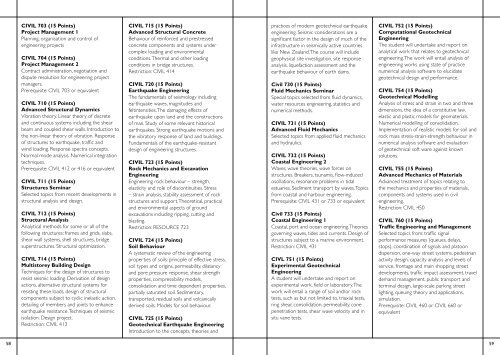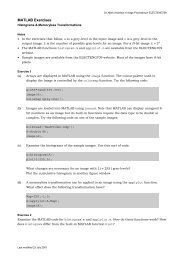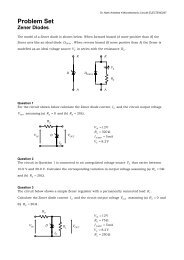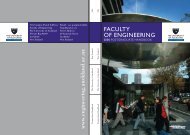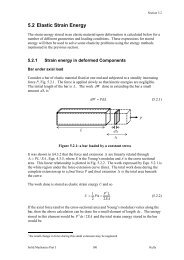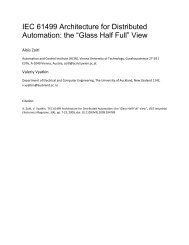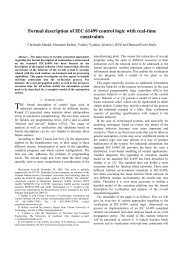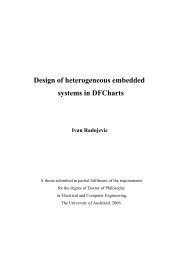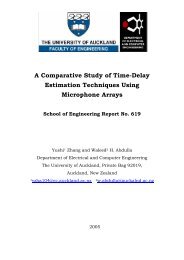www.engineering.auckland.ac.nz faculty of engineering
www.engineering.auckland.ac.nz faculty of engineering
www.engineering.auckland.ac.nz faculty of engineering
You also want an ePaper? Increase the reach of your titles
YUMPU automatically turns print PDFs into web optimized ePapers that Google loves.
CIVIL 703 (15 Points)<br />
Project Management 1<br />
Planning, organisation and control <strong>of</strong><br />
<strong>engineering</strong> projects<br />
CIVIL 704 (15 Points)<br />
Project Management 2<br />
Contr<strong>ac</strong>t administration, negotiation and<br />
dispute resolution for <strong>engineering</strong> project<br />
managers.<br />
Prerequisite: CIVIL 703 or equivalent<br />
CIVIL 710 (15 Points)<br />
Advanced Structural Dynamics<br />
Vibration theory. Linear theory <strong>of</strong> discrete<br />
and continuous systems including the shear<br />
beam and coupled shear walls. Introduction to<br />
the non-linear theory <strong>of</strong> vibration. Response<br />
<strong>of</strong> structures to earthquake, traffic and<br />
wind loading. Response spectra concepts.<br />
Normal mode analysis. Numerical integration<br />
techniques.<br />
Prerequisite: CIVIL 412 or 416 or equivalent<br />
CIVIL 711 (15 Points)<br />
Structures Seminar<br />
Selected topics from recent developments in<br />
structural analysis and design.<br />
CIVIL 712 (15 Points)<br />
Structural Analysis<br />
Analytical methods for some or all <strong>of</strong> the<br />
following structures: frames and grids, slabs,<br />
shear wall systems, shell structures, bridge<br />
superstructures. Structural optimization.<br />
CIVIL 714 (15 Points)<br />
Multistorey Building Design<br />
Techniques for the design <strong>of</strong> structures to<br />
resist seismic loading. Derivation <strong>of</strong> design<br />
<strong>ac</strong>tions, alternative structural systems for<br />
resisting these loads, design <strong>of</strong> structural<br />
components subject to cyclic inelastic <strong>ac</strong>tion,<br />
detailing <strong>of</strong> members and joints to enhance<br />
earthquake resistance. Techniques <strong>of</strong> seismic<br />
isolation. Design project.<br />
Restriction: CIVIL 413<br />
CIVIL 715 (15 Points)<br />
Advanced Structural Concrete<br />
Behaviour <strong>of</strong> reinforced and prestressed<br />
concrete components and systems under<br />
complex loading and environmental<br />
conditions. Thermal and other loading<br />
conditions in bridge structures.<br />
Restriction: CIVIL 414<br />
CIVIL 720 (15 Points)<br />
Earthquake Engineering<br />
The fundamentals <strong>of</strong> seismology including<br />
earthquake waves, magnitudes and<br />
feltintensities. The damaging effects <strong>of</strong><br />
earthquake upon land and the constructions<br />
<strong>of</strong> man. Study <strong>of</strong> some relevant historical<br />
earthquakes. Strong earthquake motions and<br />
the vibratory response <strong>of</strong> land and buildings.<br />
Fundamentals <strong>of</strong> the earthquake-resistant<br />
design <strong>of</strong> <strong>engineering</strong> structures.<br />
CIVIL 723 (15 Points)<br />
Rock Mechanics and Excavation<br />
Engineering<br />
Engineering rock behaviour – strength,<br />
elasticity and role <strong>of</strong> discontinuities. Stress<br />
– strain analysis, stability assessment <strong>of</strong> rock<br />
structures and support. Theoretical, pr<strong>ac</strong>tical<br />
and environmental aspects <strong>of</strong> ground<br />
excavations including ripping, cutting and<br />
blasting.<br />
Restriction: RESOURCE 723<br />
CIVIL 724 (15 Points)<br />
Soil Behaviour<br />
A systematic review <strong>of</strong> the <strong>engineering</strong><br />
properties <strong>of</strong> soils: principle <strong>of</strong> effective stress,<br />
soil types and origins, permeability, dilatancy<br />
and pore pressure response, shear strength<br />
properties, compressibility models,<br />
consolidation and time dependent properties,<br />
partially saturated soil. Sedimentary,<br />
transported, residual soils and volcanically<br />
derived soils. Models for soil behaviour.<br />
CIVIL 725 (15 Points)<br />
Geotechnical Earthquake Engineering<br />
Introduction to the concepts, theories and<br />
pr<strong>ac</strong>tices <strong>of</strong> modern geotechnical earthquake<br />
<strong>engineering</strong>. Seismic considerations are a<br />
significant f<strong>ac</strong>tor in the design <strong>of</strong> much <strong>of</strong> the<br />
infrastructure in seismically <strong>ac</strong>tive countries<br />
like New Zealand. The course will include<br />
geophysical site investigation, site response<br />
analysis, liquef<strong>ac</strong>tion assessment and the<br />
earthquake behaviour <strong>of</strong> earth dams.<br />
Civil 730 (15 Points)<br />
Fluid Mechanics Seminar<br />
Special topics selected from fluid dynamics,<br />
water resources <strong>engineering</strong>, statistics and<br />
numerical methods.<br />
CIVIL 731 (15 Points)<br />
Advanced Fluid Mechanics<br />
Selected topics from applied fluid mechanics<br />
and hydraulics.<br />
CIVIL 732 (15 Points)<br />
Coastal Engineering 2<br />
Waves, wave theories, wave forces on<br />
structures. Breakers, tsunamis, flow-induced<br />
oscillations, resonance problems in tidal<br />
estuaries. Sediment transport by waves. Topics<br />
from coastal and harbour <strong>engineering</strong>.<br />
Prerequisite: CIVIL 431 or 733 or equivalent<br />
Civil 733 (15 Points)<br />
Coastal Engineering 1<br />
Coastal, port and ocean <strong>engineering</strong>. Theories<br />
governing waves, tides and currents. Design <strong>of</strong><br />
structures subject to a marine environment.<br />
Restriction: CIVIL 431<br />
CIVL 751 (15 Points)<br />
Experimental Geotechnical<br />
Engineering<br />
A student will undertake and report on<br />
experimental work, field or laboratory. The<br />
work will entail a range <strong>of</strong> soil and/or rock<br />
tests, such as but not limited to, triaxial tests,<br />
ring shear, consolidation, permeability, cone<br />
penetration tests, shear wave velocity and in<br />
situ vane tests.<br />
CIVIL 752 (15 Points)<br />
Computational Geotechnical<br />
Engineering<br />
The student will undertake and report on<br />
analytical work that relates to geotechnical<br />
<strong>engineering</strong>. The work will entail analysis <strong>of</strong><br />
<strong>engineering</strong> works using state <strong>of</strong> pr<strong>ac</strong>tice<br />
numerical analysis s<strong>of</strong>tware to elucidate<br />
geotechnical design and performance.<br />
CIVIL 754 (15 Points)<br />
Geotechnical Modelling<br />
Analysis <strong>of</strong> stress and strain in two and three<br />
dimensions, the idea <strong>of</strong> a constitutive law,<br />
elastic and plastic models for geomaterials.<br />
Numerical modelling <strong>of</strong> consolidation.<br />
Implementation <strong>of</strong> realistic models for soil and<br />
rock mass stress-strain-strength behaviour in<br />
numerical analysis s<strong>of</strong>tware and evaluation<br />
<strong>of</strong> geotechnical s<strong>of</strong>t ware against known<br />
solutions.<br />
CIVIL 755 (15 Points)<br />
Advanced Mechanics <strong>of</strong> Materials<br />
Advanced treatment <strong>of</strong> topics relating to<br />
the mechanics and properties <strong>of</strong> materials,<br />
components and systems used in civil<br />
<strong>engineering</strong>.<br />
Restriction: CIVIL 450<br />
CIVIL 760 (15 Points)<br />
Traffic Engineering and Management<br />
Selected topics from: traffic signal<br />
performance measures (queues, delays,<br />
stops), coordination <strong>of</strong> signals and platoon<br />
dispersion, one-way street systems, pedestrian<br />
<strong>ac</strong>tivity design, cap<strong>ac</strong>ity analysis and levels <strong>of</strong><br />
service, frontage and main shopping street<br />
developments, traffic imp<strong>ac</strong>t assessment, travel<br />
demand management, public transport and<br />
terminal design, large-scale parking street<br />
lighting, queuing theory and applications,<br />
simulation.<br />
Prerequisite: CIVIL 460 or CIVIL 660 or<br />
equivalent<br />
58<br />
59


